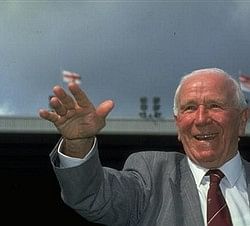
There's more to great managers than just trophies
Sir Matt Busby, Bill Shankly, Arsene Wenger, Miguel Munoz, Brian Clough, Helenio Herrera, Rinus Michels, and Sir Alex Ferguson. They are all great managers. Legendary managers.
Their names have been etched into football history forever. They respectively transformed football ideology, management, and the system around them. Some of them can boast of a huge trophy cabinet, some cannot. But is it trophies that gauge a manager’s ability? Is it only material success that guarantees them a place amongst the who’s who of managerial greats?
Definitely not the case.
Sir Matt Busby
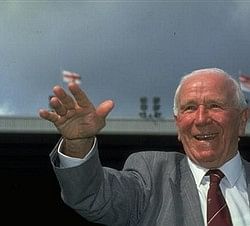
Sir Matt Busby
The father of Manchester United. The man who built the club. The man who single handedly transformed United from a World War II bomb site, to one of the most famous clubs in the world.
His trophy cabinet may not be all that impressive, but there’s a lot more to it than just trophies.
Matt Busby across his 25 year reign, built 3 great teams. His first team finished runners-up in his first three years in charge ie. 1947-1949. In 1951 Man United finished second yet again . But they finally claimed the title in in 1952 after 42 long years.
This was his first breakthrough. Reviving Manchester United from being drifters in the First Division to being Title Winners.
His next team was probably his greatest ever achievement. Busby believed that the club required a strong Youth Policy to enhance local scouting and developing talent. The “Busby Babes” as they were known back then, became national icons.
Their record too was marvelous. First Division winners in 1956 and 1957, FA cup finalists in 1956 and European Cup semi-finalists in 1957 and 1958. They were the only team in Europe that came close to beating the great Real Madrid of the 50s, all this only at an average age of 23.
Tragically, as we all know, the Babes were put to rest in the Munich Air Crash and the world never got to see what they could have become. It is well established that the Busby Babes would have gone on to dominate Europe and bring a significant number of trophies to the club.
The 1960s saw Busby’s rebuilding completed once again. Winners of the FA Cup in 1963, quarter-finalists in the European Cup Winner’s Cup, semi-finalists in the Inter Cities Fairs Cup, First Division runners-up in 1964 and 1968, First Division winners in 1965 and 1967, European Cup semi-finalists in 1966, (which included a 5-1 demolition of Eusebio’s great Benfica side), and winners of the European Cup in 1968.
This was his second breakthrough. Manchester United who were domestically dominant, were now part of the European Elite. The transition from a team that had not the First Division for 42 years to a team that was the best in Europe. Matt Busby had not just built a club, he had built a legacy.
Manchester United today, still follow the policy of a strong youth system. Mark Hughes, Ryan Giggs, Lee Sharpe, Paul Scholes, David Beckahm, Nicky Butt, the Neville brothers, Danny Welbeck, Tom Cleverley, Paul Pogba, Ravel Morrison have all graduated from the youth academy in Sir Alex’s reign. Sir Alex has also bought in young players from other clubs and developed them at United, namely Ole Solskjaer, Cristiano Ronaldo, Wayne Rooney, Luis Nani etc.
United still follow the Busby philosophy of playing football ie. with plenty of flair and an aptitude to entertain. Sir Alex Ferguson was also mentored by Sir Matt in his first few years in charge. The foundations had been laid by him. Even today, Man United remain on the hunt to win more Champions League titles, the European obsession built into the the very fabric of the club. All this a testament to Busby’s greatness.
Bill Shankly
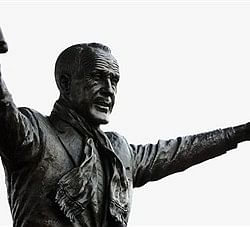
Shankly’s statue at the gate of Liverpool FC
Probably the most dynamic personality in football’s history. Bill Shankly was to Liverpool, what Matt Busby was to Manchester United. Liverpool were a team floating in the second division for 5 years when he took over, and in the 15 years that he managed the club, transformed almost every single aspect about the club, including it’s footballing ideologies and principles.
Shankly first led Liverpool to the Second Division title in 1962. Remarkably 2 years later, he led Liverpool to the First Division title in 1964. In his first European Campaign, Liverpool reached the semi-finals.
Interestingly, in the second round against Anderlecht, he decided to experiment with the Liverpool kit. Instead of the red shirt and white shorts, he opted for a full red kit, one that he deemed more intimidating.
Liverpool have worn All Red since.
Shankly was also a master of psychology. The ‘Thus is Anfield’ plaque secured to the wall above the player’s tunnel was one of his innovations to intimidate the opponent.
He rebuilt the training facilities at Melwood, and insisted on spending big money on quality players, even though the board was reluctant. He deployed long distance running on roads and introduced new training methods and fitness drills, some of which was inspired from his days at Preston.
He enhanced the youth system and promoted several players from the reserves. This won him another league title in 1966 and an FA cup in 1965. He also took Liverpool to a European Cup Winner’s Cup final, although they lost out to Borussia Dortmund. The next few years Liverpool consistently finish in the top 5, but with no major silverware. His persistence to stick with his players cost him, but he eventually rebuilt the side in the early 70s, which went to dominate England and Europe under Bob Paisley.
He won the league in 1973, the FA cup in 1974 and was a losing finalist in 1971. The UEFA Cup in 1973 was his last European success, and by then 15 years of management had taken its toll. Bill Shankly resigned as Liverpool manager, leaving Liverpool in shock. Such was his influence on the fans, that during an interview with a 10-year old boy about Shankly’s retirement, the boy was almost in tears and refused to believe that Shankly had truly vacated his post.
Liverpool Football Club have erected the ‘Shankly Gates’ in his memory along with a statue of him outside Anfield.
Bill Shankly was primarily responsible for all the success that followed his retirement. It was his team that went on to win everything under Paisley, it was his ideals that set Liverpool Football Club into motion. He didn’t win an awful lot in his 15-year reign, but Liverpool Football Club is what it is today because of him.
Helenio Herrera
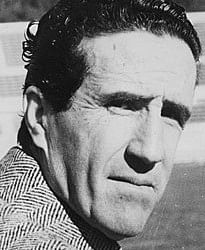
Helenio Herrera
Apart from winning 16 major titles with three different clubs, namely Atletico Madrid, Barcelona and Inter, Helenio Herrera had a huge impact on the footballing world.
He excelled in the use of psychological motivating skills. Phrases such as ‘Class + Preparation + Intelligence + Athleticism = Championships’ were plastered all around the training ground and chanted by players during training sessions.
He was a strict disciplinarian and enforced strict rules on players. He forbade players from drinking and smoking and also had a reasonable control on their diets.
He introduced the “ritiro” concept, a hotel retreat into the countryside few days in advance to prepare for a game.
He successfully implemented the Catenaccio, an Italian tactical system that focuses on defense, by using a sweeper behind the defenders to pick up loose balls and the usage of lightning quick counter attacks.
It is highly ironic that Herrera was attributed to building the first great defensive side because his previous team was a devastatingly attacking one. By placing inside-forwards in the normally defensive wing-half positions at Barcelona, matches would be turned into massacres. Yet Inter’s success in the 60′s is attributed to him, and him alone.
The change in style was not new to him. He was a master adapter. He won titles at Atletico Madrid, then moved onto to Barcelona, bringing in a whole new attacking dimension. At Inter, he completely over turned his philosophy to give the footballing world a different approach to winning a game. Defend, and only defend.
Although he has been successful, trophy wise, its all the little things he’s done that he’s remembered for. Its not his trophy cabinet, but his tactical acumen and adaptability that has endeared across generations.
Rinus Michels
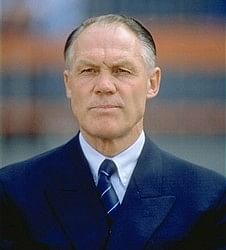
Rinus Michels during Euro 1988
Named ‘Coach of the Century’ by FIFA in 1999, Rinus Michels’ revolutionary tactics has give birth to some of the greatest footballing sides the world has ever seen, namely the Dutch National Team of the 1970s led by Johan Cruyff, the Ajax team of the 70s, Cruyff’s Barcelona of the 1990s nicknamed the ‘Dream Team’, Arsene Wenger’s ‘Invincibles’, and Pep Guardiola’s all conquering Barcelona.
It was not his invention, but it was his perfection in implementation that resulted in this whole new dimension that shook the football world.
He was appointed head coach of Ajax in 1965 . From then on Ajax went from relegation candidates to a team that won the national championship four times, and the KNVB three times in the following six years. In 1969, they reached the final of the European Cup for the first time, being defeated 4-1 by Italian side A.C. Milan.
In 1971, he managed Ajax’s to the first of their three consecutive European Cups, a feat only achieved previously by the great Real Madrid team of Di Stefano and Puskas. Everything seemed perfect about the man. Not really.
If there is one criticism of Rinus Michels, it is the fact that he missed the peak of most of his projects. Ajax went on to do greater things after his first European Cup victory, Netherlands hit the self-destruct mode in the 1974 World Cup final despite being clear favourites. His time at Barcelona didn’t yield much, and it was only after his departure that Johan Cryuff arrived to create the phenomenon of Barcelona.
Probably the saving grace would be his victory in the 1988 Euros. The Dutch had finally won their first major international tournament and with the likes of Van Basten and Ruud Gullit, they won the tournament with style and panache. But that was to be his last major trophy.
Rinus Michels was probably the most influential coach of all time. The mighty Barcelona team we see today, does not stem from Pep Guardiola’s tactics who most claim were inspired from Johan Cryuff’s Barcelona, but it was the ‘Total Football’ system perfected by Rinus Michels in the 70s that brought the world ‘Beautiful Football’ and effectively killed the Catenaccio (Ajax crushed Inter in the 1972 European Cup final).
Sir Alex Ferguson
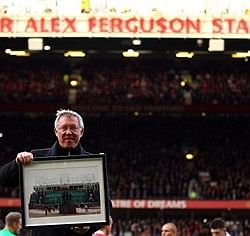
Sir Alex on his 25th anniversary in charge of United
The fiery Scotsman is widely compared to one of his predecessors at the club, Sir Matt Busby.
Manchester United, before him, were one of the fallen giants of world football that were steaming down into mediocrity. From then on, United first dominated England in the 90s, and then were crowned European Champions in 1999, and even today are one of Europe’s most feared teams. An era of consistent success from 1988 to 2012 has seen Ferguson build 4 different teams and he is currently building his 5th great side.
In terms of what he’s taught the world, it has to be his man management skills, ability to rebuild sides, a great judge of character, an eye for talent, his re-structuring of the United youth system and his belief in youth players, knowing when to let go off players, and when to hold on to them. A hoard of stars have come and gone, gliding across the Old Trafford pitch, but United have always remained successful. How is it that with so much change forced onto him, he still remains successful?
This answer to this question probably entitles him to be one of the greatest managers of all time.
Bryan Robson, Mark Hughes, Eric Cantona, Steve Bruce, Gary Pallister, Peter Schmeichel, the Neville brothers, Nicky Butt, Andy Cole, Dwight Yorke, Ryan Giggs, Paul Scholes, Ole Solskjaer, Roy Keane, David Beckham, Ruud Van Nistelrooy, Cristiano Ronaldo, Wayne Rooney, Jaap Stam, Edwin Van Der Sar, Carlos Tevez, Rio Ferdinand are just some of the great names spanning across three different generations, that have had the privilege of referring to Ferguson as their ‘Boss’. Man management at its pinnacle.
If there is one flaw or one area of under achievement, four European titles, an Intercontinental Cup and one Club World Cup title across his managerial career taking into account his spell at Aberdeen, does seem a tad too less. The early 90s saw United struggle; the European ban imposed on English clubs having been only recently lifted causing English clubs to lag behind . The late 90s saw a emerging United, and the early 21st century saw an under-achieving United side that boasted the likes of Beckham, Scholes, Giggs, Cole, Yorke, Van Nistelrooy etc.
Of course there were plenty of heartbreaking losses, like the defeats to Barcelona in 2009 and 2011 or the many quarter-finals defeats in late 90s and early 2000s, or that shocking semi-final defeat on the away goals rule to Bayer Leverkusen in 2002.
But at the end of it all, Sir Alex will leave behind a legacy of unparalleled success, when he eventually quits the United hot seat. Even today, he grooms United’s promising youngsters to feed his European ambition with his 5th team. In a way, his managerial career does echo that of his mentor Sir Matt Busby. He rebuilt Manchester United into a domestic powerhouse, a European Giant, and has established Man United as one of the most marketable names in world football. And to do all this, in a highly competitive world, with four different teams, and winning silverware with each of them is by no means a tame feat.
Arsene Wenger
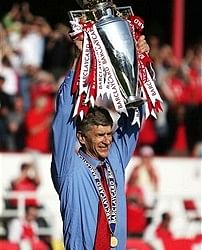
Arsene Wenger celebrating after winning the League title in 2004
‘The Professor’ as he is commonly referred to, is one of the managerial greats of the Premier League era in England. Arsenal FC today is a global brand thanks to this man. His ideology of the purist version of the passing game, his insistence on youth oriented teams and his tactical acumen are his factors to success. Multiple winner of the Onze d’Or and voted World Coach of the decade by the IFFHS, the respect he garners amongst his peers is second to none.
Completing double with Arsenal in his first season in charge in 1997-98, Wenger proved to be Alex Ferguson’s biggest rival. From 1997 to 2004, Wenger challenged United on all fronts being their biggest rival, winning the double in 2002, the FA Cup the next season, the double again in 2004 and the FA Cup the following year. His shoe string budget proved in no way to be a hindrance, and Wenger successfully built two great teams with hardly any astronomical investment. His 3rd team started out on a promising note by reaching the Champions League final in 2006, although they lost the game after a late surge by Barcelona.
From then on, his star players left one by one and Wenger’s insistence to play a young team required him to plead for time, to see his team mature season after season. Even through this rebuilding, Wenger overlooked the construction of Arsenal’s modern stadium, the Emirates which housed a capacity of 65,000. His team consistently finished in the top 4, playing second fiddle to a financially powerful Man United, Liverpool and Chelsea. They also reached the Champions League quarter-finals in 2008, and the semi-finals in 2009.
In 2011, it seemed like his efforts paid off, as midway through the season, Arsenal were on top of the Premier League table, had just beaten Pep Guardiola’s great Barcelona at the Emirates, and were in the Carling Cup final and the FA cup quarter-finals. But a freak mistake in the Carling Cup final and an inexplicable sending off, of Robin Van Persie at the Camp Nou saw Arsenal’s season fade away, although they finished inside the top 4 yet again. Stars left at the start of the next season, and Wenger with limited time and money guided a make shift Arsenal side to a respectable third placed finish in the Premier League.
Arsene Wenger’s impeccable record of finishing in the Top 4 in all his seasons in charge of Arsenal, is matched only by Sir Alex Ferguson. His effective skills in the transfer market have seen great players strut their stuff at Arsenal in spite of the lack of a financial backbone. His so called ‘out dated’ philosophy has given us the ‘Invincible’ team of 2003-2004 that won the League unbeaten. Although his next rebuilding took a tumble with the untimely exit of star players, he has still managed to embark on this magnificent run of consistency.
It’s sad to see the treatment vested out to him by football fans, and it is tragic to know, that Arsene Wenger will get his due only when he retires from Arsenal FC.
The managers listed above are only some of the more famous examples that I have listed out. There are so many others that can boast of a similar plethora of achievements. It’s about time we as football fans stop gazing at glistening trophy cabinets and a dig a little deeper. After all, a manager is judged by the legacy he leaves behind, and trophies my fellow compatriots are not a legacy to behold.